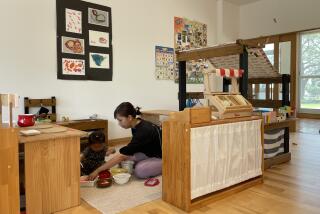Algerians Warned on Population Growth
- Share via
ALGIERS, Algeria — This country’s leaders have an urgent message for their people: Give up the traditional goal of a large family or face a future of poverty, ignorance and dependence on imported food.
Planners fear that the country’s annual population growth rate of 3.2%, which would double Algeria’s numbers in 22 years, will nullify their attempts to convert oil and gas revenues into a higher standard of living.
A recent study by the ruling National Liberation Front party projects that the present growth rate, one of the world’s highest, will push Algeria’s population from 22.6 million now to 35.7 million in the year 2000 and 120 million by the year 2100.
Providing food, jobs, houses and schools for this mass of people is a task that not even Algeria’s oil and gas wealth can pay for, according to the 28-page study published in the weekly Revolution Africaine.
“The demographic explosion is coming and it threatens to wipe out the results of considerable efforts in the economic and social fields,” it says.
60% of Food Imported
Even now, Algeria imports about 60% of the food it eats, and food consumption is rising faster than the population.
Algeria is boosting investment in the neglected agricultural sector and trying to persuade Algerian women to give up the traditional goal of a dozen children, though officials in Algiers say there is resistance to birth control on religious grounds.
The party document says Algeria must act “rapidly and firmly” and recommends a campaign to persuade women to space out their pregnancies, preferably with 33 months between babies.
It does not mention any sanctions against families who fail to take the advice, but recently the Cabinet discussed undisclosed “statutory measures” on population.
These were part of what the official newspaper El Moujahid called “moves to create the right psychological and health conditions for the success of national population policy.”
The study acknowledges that it will take a revolution in thinking to reduce the birthrate of Algerian women, whose prestige tends to rise with the number of their sons.
Unless Algeria is to remain underdeveloped, it will have to abandon the big-family mentality born of centuries of famine, war and plague, it adds.
Contraceptives Scarce
The effect of previous efforts to limit population growth has been “limited if not The effect of previous efforts to limit population growth has been “limited if not insignificant,” the study says, noting that the country has a mere 399 “birth-spacing centers” and that supplies of contraceptives sometimes run out.
This “timid” approach to birth control has, according to El Moujahid, been prompted by “religious traditions which frequently liken birth-spacing and contraception to a grave violation of divine commandments.”
Islam banned the ancient Arab practice of murdering infant daughters--a drastic form of population control--and religious tradition has been cool towards contraception.
Algerian religious authorities gave the go-ahead to contraception as long ago as 1968, though it seems the message has not gotten through to women, especially in rural areas.
The party study hints at a tougher approach and says the National Libertion Front--Algeria’s only political organization--will have to fight against anti-birth-control traditions.
But diplomats see no immediate sign of coercive measures by the authorities, who are under strong pressure from an Islamic revival that constitutes a major source of opposition.
Any such measure would run counter to the trend of President Chadli Bendjedid, who they say has generally moved cautiously in search of consensus.
More to Read
Sign up for Essential California
The most important California stories and recommendations in your inbox every morning.
You may occasionally receive promotional content from the Los Angeles Times.













